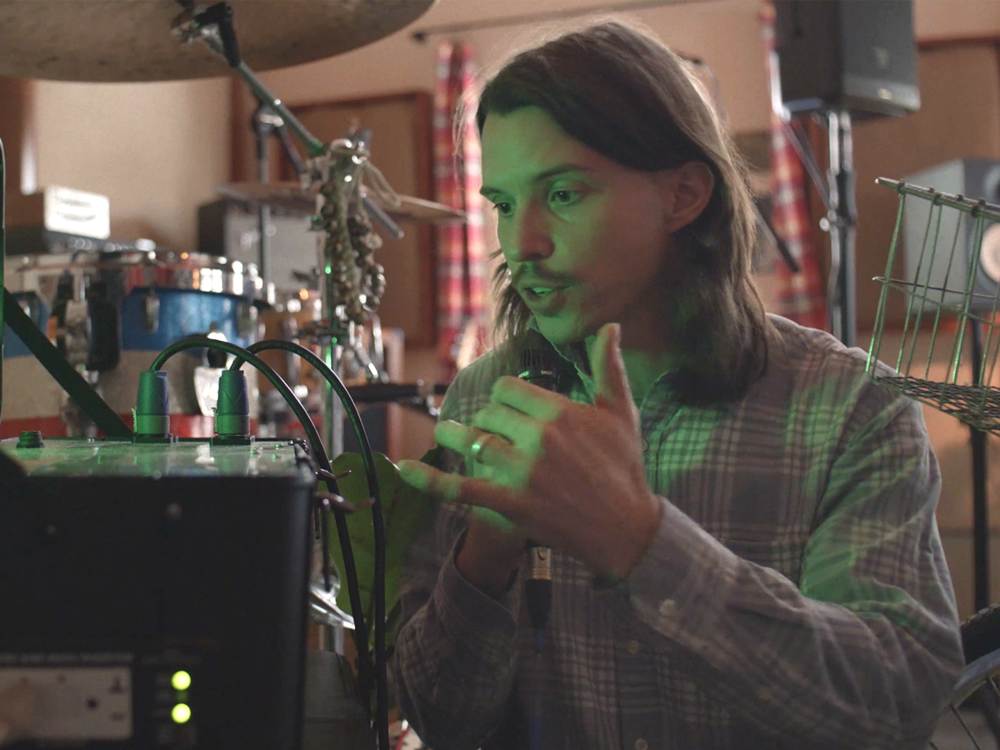Section Branding
Header Content
How rock duo Illiterate Light bring sustainability to live performance
Primary Content
Since the onset of the COVID-19 pandemic, the state of live music has been in flux, shuttering venues nationwide and bringing touring to a halt. As the music industry continues to navigate the nuances of COVID-19 variants on a global scale, outdoor concerts and club shows have reemerged in modified formats. While necessary, these precautions tend to exacerbate an element that's already inherent to performance — the physical space between the performers and their audience.
"I know what it's like to be an audience member, but I also know what it's like to be the artist and to feel that divide, says Jake Cochran, one-half of the touring duo Illiterate Light. "There's a lot of times where I want the connection with the audience in a way that I don't know how to create."
"A lot of times during COVID, even if we played a festival, there was a big outdoor stage and then 30 feet of barriers and people sitting in lawn chairs," he continues. "I know we need space, but I [was] having a hard time connecting."
Cochran founded the alt-rock outfit Illiterate Light with guitarist Jeff Gorman after the two met as sophomores at James Madison University in Harrisonburg, Va. over a decade ago. Sharing an interest in environmentalism and social justice, they joined a cohort of other musicians from the university in an annual summer bike tour called the Petrol-Free Jubilee, traveling throughout Virginia by bike and stopping to play gigs along the way. Not only did the bikes provide a way to avoid burning fossil fuels on the road, but they also became a staple of the crew's live performance. By putting a bike on a generator stand, the group was able to power a small PA system while an audience member or a fellow performer pedaled.
"When we experienced [the bike generators] for the first time in 2012, it rewired my brain in how I understand my use of electricity, because live music and sound is something I've always loved, but I had no idea the cost associated with it," Cochran explains. "It's really an experience that, since then, has followed Jeff and I around in a way that we wanted to share with a bigger number of people."
Cochran and Gorman took on an agricultural internship during their senior year of college and began farming by day while playing music by night. After graduation, they continued both passions — selling produce at the local farmer's market and garnering a following performing at clubs in Central Virginia.
"The first time I ate food that we grew, it was like we were so connected. We were suddenly creators of the thing that we were enjoying and I felt the same way when we first started the bike-powered stuff," recalls Gorman. "We were still consumers, but now we were taking part in this creative process and that sparked a lot of excitement."
Rethinking their place as performers in an industry disrupted by the pandemic, Illiterate Light is reviving the bike-powered set as a way to forge a new connection with audiences — all while doing their part to help the environment.
"Regarding sustainability, it can feel really difficult to even know where to begin because the honest truth is that we live in a pretty unsustainable consumer culture, so it's really hard to know how to break that," Gorman says. "One area that we've landed on is to start where you're at and it's got to bring joy."
With those guiding principles in mind, Illiterate Light is breaking the audience barrier by forging a new path. Last August, the duo relaunched the bike generators for a handful of songs during a three-night run at their hometown music venue, The Golden Pony. Made by a company out of Oakland, Calif., Rock the Bike, the bike generators differ from solar offerings and other green touring initiatives in that they don't have any battery storage. The energy that each audience member generates on the bike is immediately transferred to the speakers so that in order for the music to get louder, the audience members have to pedal more.
"We're approaching the bike generators as an experiment that we can't do alone. It's just an open invitation to show up and figure it out with us and it's risky," says Cochran. "We'll probably have shows that will flop because somebody gets off a bike and somebody else gets on and in that minute-long process, the power has dipped enough that the PA cuts off and the show stops."
Cochran and Gorman plan to continue this experiment on a small scale as they begin touring behind new music. While they're not in a place to perform a whole cross-country tour that's powered by bicycle, they can supplement their tour with intimate club or outdoor shows that utilize the two bike-powered generators and small sound system that they currently have, with bikers trading out between each song.
"We're inviting chaos into something which is, I think, a necessary step to expanding our minds and discovering what other solutions to these problems could be," Cochran says. "But both Jeff and I love and live in a space where we have to put ourselves in a place where we might fail, or else why are we even doing it? That's how we create music and how we live our lives."
Copyright 2022 WNRN. To see more, visit WNRN.

